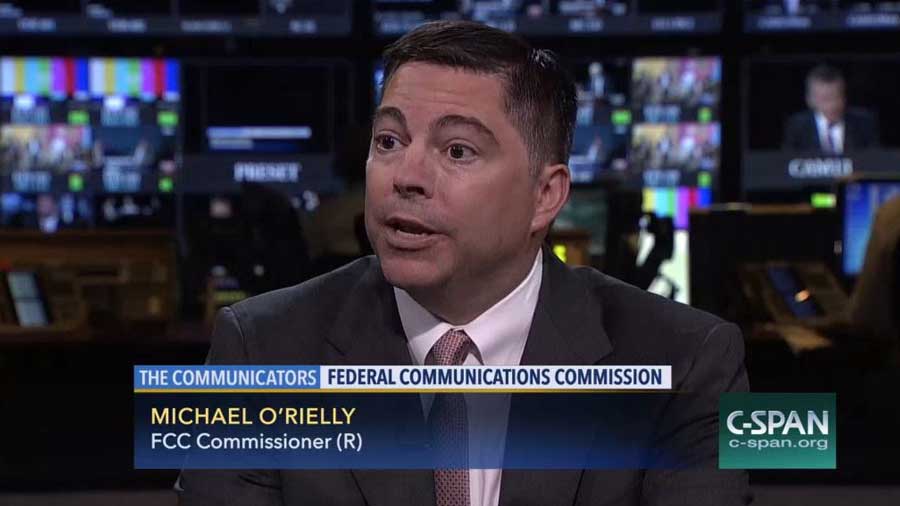O'Rielly: Trump Characterization of Protests Was Wrong

The smarter way to stay on top of broadcasting and cable industry. Sign up below
You are now subscribed
Your newsletter sign-up was successful
Add one of the FCC's majority commissioners to those calling into question President Donald Trump's equating of the two sides in a protest between racists and those opposing their hateful ideology.
FCC Commissioner Michael O'Rielly said the President was wrong to suggest there were some fine people among the racist and neo-Nazi protestors who sparked violence in Charlottesville, and said he was "astounded" by the President's press conference Wednesday, Aug. 16.
That came in an interview for C-SPAN's Communicators series that airs this weekend.
Related: Trump Approval Rating Ticks Down
The commissioner was asked by journalist Lydia Beyoud of Event Driven News whether he agreed with platforms—Facebook and Google—that, in the wake of the Charlottesville attacks, removed racist speech.
He said he completely rejected the "harmful and hateful material that was present in Charlottesville.
"I was not available to comment previously," he said. "But I was just astounded when I got back to town to see what had happened and to see the [President's] press conference yesterday and the transcript from some of that."
Related: Writers Guild: Trump Disgraces Nation
O'Rielly said he was troubled by the President's comment that there were fine people in both camps. "The President's point I think was wrong. I don't think there are fine people in some of these hateful groups. I don't think you can be a fine person in a hateful group. I don't think those things go together."
But he said that was different from whether he wanted the government to regulate that speech. “I think that harmful speech should be called out," he said, but that the solution to that is more speech rather than trying to filter out the bad speech.
“Education, more information, more discussion, more speech are the solution."
Related: Charlottesville Fallout: Trump Ends Advisory Councils
He said he realized that it was important to law enforcement to prevent the violence that occurred and why law enforcement needs to get access to some information.
The commissioner branded as inaccurate and inappropriate a New York Times story that suggested FCC Chairman Ajit Pai's deregulatory agenda was tied to Sinclair's effort to buy Tribune stations.
Pai has launched a proceeding to review all media-related rules, as the FCC has periodically done for telecom regs.
O'Rielly was asked what he includes in the competitive media marketplace. He said it was not just the three networks anymore, but a "wider swath of material" from different sources. He says the commission erred in the past by only comparing radio to radio, for example, while instead everyone is really fighting over the same eyeballs—or ears—attention spans and dollars.
He said over-the-top competition "has to be taken into account."
The FCC is separately going to be looking at media ownership regs per a congressionally mandated quadrennial review. O'Rielly said he would not go so far as saying all the ownership regs should be eliminated. He said, for example, you would not want one entity owning every outlet in a market.
The commissioner was asked whether he supported cell phone voice service on planes, an issue that drew some major pushback when it was teed up under then FCC chairman Tom Wheeler. O'Rielly pointed out that Pai has proposed removing that tee and closing the item, and O'Rielly said he agreed.
But he said he supported "the opportunity" to boost data and broadband speeds on airplanes. He said as a consumer he wants to see higher bandwidth and speeds.
The episode will air Saturday, Aug. 19 on C-SPAN at 6:30 p.m. ET, and Monday, Aug. 21, on C-SPAN2 at 8 a.m. and 8 p.m. ET.
The smarter way to stay on top of broadcasting and cable industry. Sign up below
Contributing editor John Eggerton has been an editor and/or writer on media regulation, legislation and policy for over four decades, including covering the FCC, FTC, Congress, the major media trade associations, and the federal courts. In addition to Multichannel News and Broadcasting + Cable, his work has appeared in Radio World, TV Technology, TV Fax, This Week in Consumer Electronics, Variety and the Encyclopedia Britannica.

